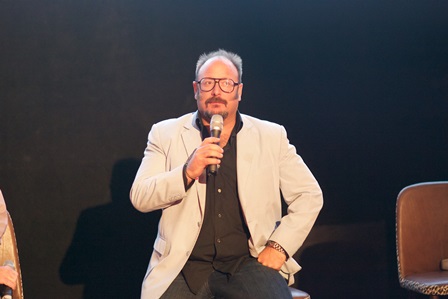Nick Batzias at the World IP Day forum.
More than 100 film and television students have joined Madman head of production Nick Batzias and copyright law experts to explore issues surrounding the future of screen IP in the digital age.
The event was held to mark World IP Day, a UN initiative established in 2000, to celebrate the role of intellectual property in creativity and innovation.
AFTRS chief executive, Neil Peplow, A Month of Sundays producer Batzias and copyright law specialist Caroline Verge shared insights on the value of creative content, making Australian films and TV and managing change in the digital age.
While the Australian Screen Association’s newly appointed executive chairman, Paul Muller, joined with executive director of creative content Australia, Lori Flekser, to host the World IP Day event at Hoyts Cinemas at the EQ precinct.
Peplow said the emphasis was the ownership of IP.
“I think it’s not about heritage versus new business models,” he said. “It’s based on the fact that you will be able to protect the work that you have created. I think that has to be the basis of any business model that actually establishes itself in the long term, or business models that establish themselves in the long term.
“There is a difference between going out and making something for nothing which gets eyeballs and then getting noticed to ensuring it’s a sustainable career, and the sustainable career is based on the fact that you can own and protect the IP in your work.”
Peplow said he produced a film which was downloaded 1.4 million times within two weeks of its release.
“This destroyed any recouping,” he said.
Nick Batzias, Lori Flekser, Neil Peplow, Caroline Verge and Paul Muller.
“I was very angry that happened but quite proud that 1.4 million people would bother doing that and then thinking if we charged them a dollar each then we would have been in profit because the budget would have been around the $2 million mark.
“It’s understanding there is demand, but the demand is based on a free model and that is based on the fact that people feel there isn’t anything wrong with taking other people’s IP.
“I think it’s the whole thing of having the flexibility of business models based on being able to sustain a career around the IP that you produce – that was kind of paramount. That was the main message.”
Batzias introduced the preview screening of A Month of Sundays written, directed and produced by Matthew Saville and starring Anthony LaPaglia, Julia Blake, Justine Clarke and John Clarke. The film will be released by Madman Entertainment on April 28.
Batzias said A Month of Sundays was a real home brew.
“It’s written, directed and produced by Australians, who have honed their skills on local productions, many going on to forge international careers,” he said.
“As such, whilst we were local, the production had a world class team.
"A healthy local industry is not only a cornerstone of our culture but provides an opportunity for Australian creatives to have an international career.”
Flekser said there was a “refreshingly long list” of reasons to celebrate. These include copyright legislative changes (Copyright Amendment Bill 2015), the growth of dynamic online services for the distribution of screen content and a slight decline in the number of Australians accessing pirated film and TV content online.
She urged the students to be aware of the challenges the digital age brings, including lost revenue from piracy which impacts investor confidence and could be a “career killer” for ambitious new content creators.
Muller said the Australian Screen Association was working towards a flexible, adaptive IP framework to help ensure that artists and creative industries in our digital world can be properly paid for their work.
“Our future focus will be on ensuring that copyright is strengthened rather than weakened and that will help many of the students here today generate their own successes in coming years,” he said.



